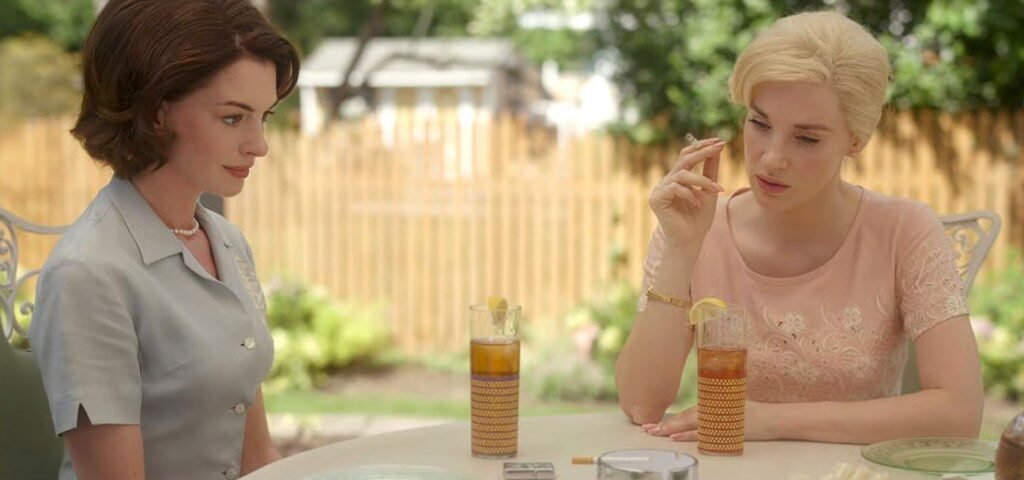


‘The Beautiful Game’ Review: Bill Nighy Leads a Game Cast in Netflix’s Sweet, Predictable Soccer Dramedy
March 30, 2024


‘Godzilla x Kong: The New Empire’ Review: Dull Humans Prove a Drag on Monster Mayhem in So-So Franchise Entry
March 31, 2024The 1960s-set film, directed and shot by cinematographer Benoît Delhomme, tells the story of besties torn asunder when one of their sons dies in an accident.
Mothers’ Instinct
Mommy dreariest.
Esteemed cinematographer Benoît Delhomme’s credits have included a conspicuous number of thoughtful, visually sumptuous period pieces, such as The Talented Mr. Ripley, The Theory of Everything and Lady Chatterley’s Lover, as well as a few films made to promote fashion brands like Balmain, Dior and Chanel. In a way, that résumé partially explains why he might have been inclined to make his directorial debut with Mothers’ Instinct, for which he also serves as the DP.
A remake of a 2018 Belgian film, Duelles (directed by Olivier Masset-Depasse), and based on a novel by Barbara Abel, Mothers’ Instinct sounds on paper quite promising. A director with a stronger affinity for camp, comedy and queer sensibility, like Pedro Almodóvar or Todd Haynes perhaps, might have made this into a riotous self-mocking melodrama that, if tweaked right, might have packed a proper wallop in the last act despite the silliness of the final twist. The fatal mistake with this film as it stands, however, is that it takes itself so drearily seriously and seems to think it’s offering an incisive critique of mid-20th century patriarchy, or some such. It’s like a pop-up book version of Betty Friedan’s The Feminine Mystique that comes with a supplementary paper doll set so you can change the lead characters’ outfits.
Of course, there are tiny fractures in both marriages, barely visible on the surface, which end up shattering this little suburban Eden. It starts when the boys come home with bird boxes they’ve made at school and Max ends up falling off the balcony below his window to his death when he tries to hang it in the tree, proof that no good can come from handicrafts. Alice sees the disaster just before it happens from her garden and is running up the stairs to try to stop him but doesn’t make it in time. Prone to guilt because of the tragic death of her parents when she was a child in a car accident that she alone survived, Alice is distraught, of course. But not as distraught as Celine, who blames herself for not having kept an eye on her child every moment of the day; she was busy vacuuming when the accident happened, proving no good can come from housecleaning.
Celine goes away in a car, presumably to some kind of mental hospital, and comes back a month later, apparently quite chipper and ready to get on with life as best she can, since she can never have another child. “Something was broken inside me,” she explains to Theo coyly when he asks why she can’t have more kids, that was fixed after Max’s birth. But Celine is at least able to do things like visit the boys’ school, much to the shock and horror of Alice, who, like the two husbands and Simon’s bitchy mother, Jean (Caroline Lagerfelt), seems to think she should avoid anything that might remind her of Max. Obviously, this is not an approach to grief that any modern therapist would endorse, which just goes to show how much Alice, for all her talk about going back to work and her tendency to show her knowledge of history, has internalized the stifling attitudes of the time.
From here on out, Sarah Conradt’s script starts shuffling the coconut half shells around the table, suggesting that maybe it’s Alice, who admits to having spent time in an institution for depression, who’s losing her sanity. She becomes convinced that Celine, offended by something Jean said to her, killed the old woman by hiding her heart medication, and that she even has evil intent toward Theo, who is allergic to peanuts and ends up eating a carelessly left-out cookie he finds in Celine’s kitchen.
The film’s ultimate point seems to be that motherhood and suburbia drive everyone mad, but it’s not quite the progressive message the film seems to think it’s delivering. Or maybe there’s no message intended here and the whole exercise was just an excuse to allow friends Anne and Jessica to play dress-up for a few weeks.





